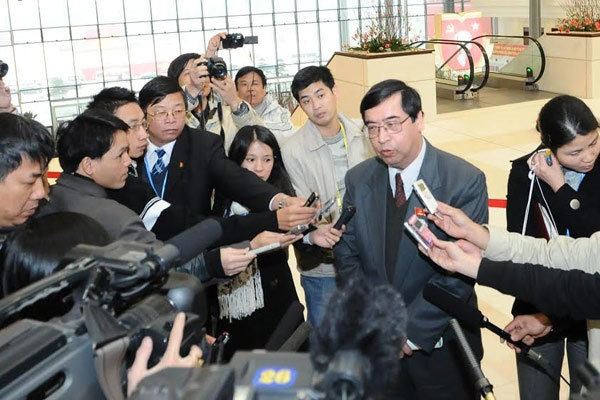 |
| Illustrative image – Photo: VNN |
Le Quoc Minh, deputy general director of the Vietnam News Agency (VNA), said the news industry is always changing, especially with rapidly changing technologies.
With Facebook and other social media platforms providing new pathways to journalism, today’s readers don’t have to work hard to find the news, he told local media recently.
In many cases, the news has to find them and adapt to changing reader habits.
Changing from paper to web, mobile, using 360-degree videos and drones might be things of the past, he said.
Artificial intelligence, augmented reality, automated journalism and real-time fact checking are trends likely to have an impact on journalism in a very near future, Minh said.
“And we will need to be where our readers are,” he said.
Dinh Thi Thuy Hang, Director of the Training Centre for Vietnamese Journalists, Viet Nam Journalist Association (VJTC), said it’s important that news organisations’ leaders have the vision to embraces changes.
“The information and the news are the things that journalism always offers. The distribution methods are going to need to be changed. We have to keep up with the trends,” she said.
Minh from the VNA said the changes have been evolving, with global journalism shifting from web-first strategy to mobile-first, and then social-first; from increasing page views to attracting readers’ loyalty and turning it into a subscription.
“It’s important that news organisations always keep on going, catching the trend, trying new strategies that combine both quality content and diversified distribution technologies,” he said.
Credibility
In the race between traditional journalism and other platforms, the biggest challenge for journalists today is not maintaining sales but maintaining credibility, Minh said.
According to Nic Newman from the Reuters Institute for the Study of Journalism, in the past eight years, reports done by the Reuters Institute showed that young readers from 18 to 25 years old mainly get their news from Facebook or Twitter.
However, the line between fake news and accurate news had been blurred since anyone can become a reporter, he said.
Nguyen Thanh Lam, director of the Authority of Broadcasting and Electronic Information under the Ministry of Information and Communication, said many news organisation have chosen to use clickbait to chase profits.
“It’s never as difficult to filter information and find the truth as now. The pressure to have news quickly prevents many reporters from having time to do research and think carefully before they write – it’s very dangerous,” he said.
With fake news proliferating, reporters are best served sticking to fact-based, objective reporting, and not reporting rumours or resorting to clickbait to attract readers, he said.
This is also an opportunity for journalists to prove their worth, expand their reach and establish their reputations, Minh said.
“The challenge for news reporters and editors is to provide accurate coverage as quickly as possible without publishing false or biased information,” he said.
Nguyen Khac Van, Deputy Editor-in-Chief of Sài Gòn Giải Phóng (Liberated Sài Gòn) newspaper, said though the business of journalism has changed, news organisations can till run a successful business providing quality journalism.
“Credibility is key,” he said.
“When news journalists can’t compete with social media in breaking news – they can offer analysis, editorial, quality explanation pieces, and of course, accurate and unbiased news sources,” he said.
Thuy Hang from the Training Centre for Vietnamese Journalists, meanwhile, mentioned “constructive journalism”.
“Journalism is about far more than just about business models or technology or product design. Constructive journalism is constructive coverage that contains valued information and knowledge that helps readers think and understand and make decisions, without having to tell them to,” she said.
Journalist Nguyen Hoang Nhat, in an article written for the Viet Nam Finance Magazine, said journalists need to have stamina in the race with social media.
“If we want to be playing a critically important role in our societies, we need to improve ourselves, to strengthen our stamina in the way we bring news and truth to the readers. We need to do it for the sake of the community we live in, for the development of the society, especially when we live in a world where there is too much ‘news’ that pretends to be journalism but is not,” he said.
Minh agreed, saying that the only way that news organisations can keep their readers is to bring quality, unbiased, honest and fair information.
“Of course, the way we present and distribute the news is also very important – the new technologies will allow us to do richer, deeper reporting, fact checking and better presenting,” he said.
VNS
 News organisations have struggled in the past two decades with readership moving from the page to computers and mobile devices, and that struggle is set to continue, according to a top journalist.
News organisations have struggled in the past two decades with readership moving from the page to computers and mobile devices, and that struggle is set to continue, according to a top journalist.